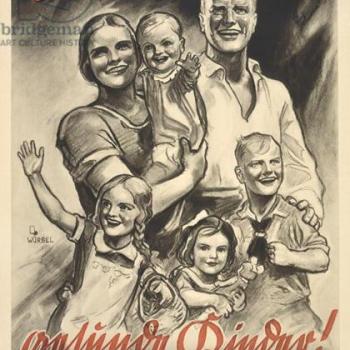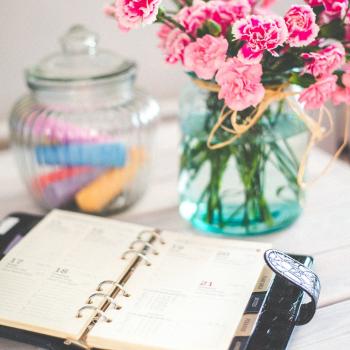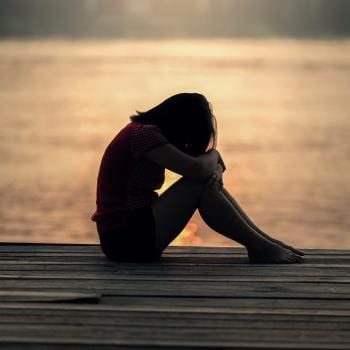Mother’s Day has been a bit weird for me for years now. When I turned 18 and left home for college, things changed between my mother and I. Or rather, they didn’t change, and that was the problem. I’ve often thought that, given that I’m the oldest and my mother was still parenting preschoolers when I left home, she just couldn’t figure out how to have a relationship. She could still order my younger siblings around and expect them to obey, but that didn’t work on me anymore.
Things got so bad that phone calls with her would leave me sobbing and I became afraid to open mail from her, because she used letters to lay guilt trips and manipulate my emotions. I would leave letters unopened for days. Sometimes I had my boyfriend read them for me and give me a summary, to gauge whether I felt strong enough to read them. Things got so bad that I finally went into therapy.
They say that a mother’s ability to love her children is virtually inexhaustible. They forget that a mother’s ability to hurt her children is also virtually inexhaustible.
But I really don’t want to make this post about my mother. She has grown over the years and is much more respectful of my boundaries than she was in the past. Over the years I have grown stronger too, and am better able to handle things when there’s trouble between us. In the end, I did not have to cut my mother off in order to reach a livable mental space. I have friends, though, who did have to cut their mothers off, and for them Mother’s Day varies from awkward to downright painful.
I have friends, though, who had to do just that.
We’re talking about mothers who are selfish and cruel, mothers who use their adult children’s younger siblings to manipulate them and know exactly the right words to use to cut their adult children to their core and send them into a downward spiral of self-doubt, depression, and pain. These are the kind of mothers who expect praise from their children and, well, from everyone else as well, for all of the sacrifices they made to raise their children, even though they’ve selfishly used their children as a tool of self-gratification and self-promotion for decades.
If Mother’s Day was something people could celebrate if they wanted to without everyone else feeling obligated to participate as well, I might feel different about the holiday. But it’s not. Instead, everyone is expected to honor and praise their mother on Mother’s Day, whether they feel she did anything worthy of praise or not. And if you don’t, well, you must be selfish and ungrateful—terms we often use for children but rarely for mothers. Think about that for a moment.
We talk a lot about the love mothers have for their children. We talk very little about how cruelly mothers can treat their children, or about the fact that some mothers don’t love their children at all, or are only capable of a selfish, twisted love. On Mother’s Day, we spend a lot of time talking about the power of motherhood, as though that power were somehow automatically and universally good.
Yes, motherhood is powerful—but that power has a dark side. Few people can hurt a person more than their mother.
We need to stop celebrating motherhood, as though it is a universally good and beautiful thing, and instead start celebrating good mothering practices and educating people about bad ones. We need to stop acting as though mothers are worthy of praise just because they’re mothers. There’s often this perception that people who choose not to have children are selfish while mothers are selfless, but this isn’t just simplistic, it’s wrong. There are plenty of people who have children for selfish reasons, using their children for their own self-gratification. Motherhood is not inherently selfless.
We need to be real about the fact that Mother’s Day causes some people pain and sadness. There are those who wanted to be mothers but couldn’t, and and those whose mothers have recently died or are terminally ill, and those whose mothers are cruel or abusive or simply demanding or manipulative. There are also people Mother’s Day leaves out, such as women who are not mothers, in a technical sense, but have nonetheless mothered children in their lives.
Perhaps you are one of those people for whom Mother’s Day feels important and significant. If so, awesome! I’m not trying to say you shouldn’t celebrate your mother if you feel she merits it. But please, take a moment and remember that there are those for whom Mother’s Day is difficult, awkward, or painful. Remember that not every mother treats her children with love, dignity, and respect. Take a moment to praise your mother for the good things she has done rather than for simply existing as a mother.
If you’re one of those for whom Mother’s Day is unpleasant or worse, know that you are not alone. Please don’t feel obligated to celebrate your mother just because she’s your mother. Mothers are not exempt from the consequences of their actions, even when those actions involve being selfish and cruel toward their children. Being a mother does not give a woman carte blanche authority to treat her children however she wants. You are not property, you are not a possession, you are not a trophy.
I am both a daughter of a mother and a mother of young children myself. Mother’s Day means my daughter brings flowers home from school and my son uses hand prints to make pictures of flowers for me in daycare. But for me, Mother’s Day is also a time of reflection. It is a time to evaluate how I treat my children and make sure I am living up to my values. Do I treat my children with respect and dignity? Do I make time for them, and value the little things they bring me or tell me?
Am I being the mother they need?
I wish more mothers would use Mother’s Day as a time to think about how they treat their children—whether those children are minors and adults—rather than approaching it simply another holiday with its trappings and rituals. It is not that we are mothers that matters. It is what we do as mothers that matters.













